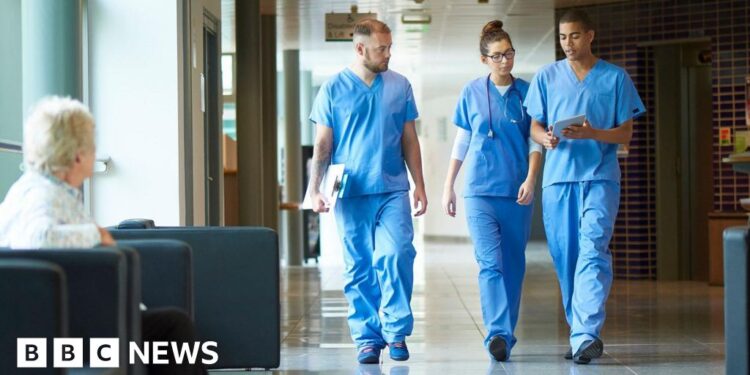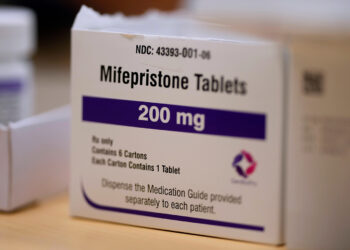 Getty Images
Getty ImagesResident doctors in Scotland are balloting for strike action after claiming government ministers went back on an agreement over pay.
BMA Scotland said the proposed uplift 4.25% for 2025/26 would have been the lowest in the UK and was less than was recommended by the independent pay review body.
But Health Secretary Neil Gray said it was a “fair, affordable, equitable pay offer” and urged members to reject strike action.
He said the Scottish government had invested in resident doctors’ pay significantly over the past two years and added that any industrial action would hinder its efforts to reduce waiting times.
Scotland’s resident doctors – previously known as junior doctors – were poised to strike in the summer of 2023 but the action was called off after a new pay offer.
As part of the last deal, BMA Scotland said the government had pledged to make “credible progress” towards restoring pay to 2008 levels, in each of the following three financial years.
Pay for a newly-qualified “foundation year” doctor currently begins at £34,500, rising to £42,792 in their second year, with the resident doctor pay scale starting at £45,503.
The strike ballot will be open from Friday until 19 December. In the event of a yes vote, industrial action is likely to take place in the first few weeks of the new year.
The ballot opens as resident doctors in England begin a five-day walkout.
Dr Chris Smith, chairman of the BMA’s Scottish resident doctor committee, said: “Doctors have been shocked that the Scottish government seem to be intent on throwing away the progress made in restoring our pay over the last two years and are clear they will stand up to protect the deal which was agreed in good faith by both sides.
“As always, we are ready to negotiate at any time and any place. But we will not sit idle while the Scottish government attempts to break the deal that they struck with Scottish resident doctors in 2023.”
He said 14 November was a “hugely significant day” for both resident doctors in Scotland and south of the border.
“I know I speak for all Scottish doctors when I say we stand beside them,” he said.
“The Scottish government now has the chance to draw a dividing line between them and Westminster, and all that requires is to revert to the status quo: return to the negotiating room with BMA Scotland, in good faith and with a credible pay offer in line with the promises they made in the deal we signed.”
He added: “Until now, Scotland has been the only nation in the UK to avoid industrial action and there is time to avert this action – but only if the Scottish government honours the commitment it made.”
Significant pay investment
Dr Smith said the Scottish government’s response had been “disappointing” and it had ignored the BMA’s requests for further talks.
“I hope that this time the government will take the necessary steps to reverse their decisions which are putting the NHS Scotland on the path to disruptive strike action,” he added.
Health Secretary Neil Gray said: “Industrial action would be in no-one’s best interests, least of all the patients who rely on our NHS. I encourage resident doctors to reject this option.
“Our fair, affordable, equitable pay offer of 4.25% for 2025/26, with a further 3.75% for 2026/27, is the same offer that nurses and other NHS staff chose to accept earlier this year.
“We value the role resident doctors play in delivering care and have invested significantly in their pay over the last two years, agreeing the highest pay awards across the public sector – an uplift of 12.4% for 2023/24 and a cumulative uplift of 11% for 2024/25.
“These awards were justified as we began the process of delivering on a 2023 agreement that we are absolutely committed to honouring.”
He said the Scottish government had already invested an additional £135.5m to tackle waiting times.
“The latest figures show our plan is working with total waiting list size reducing. Any industrial action by resident doctors would hinder our progress on that,” he added.

If resident doctors do go on strike, it will be hugely disruptive and bruising for the Scottish government.
It would be the first major walkout of NHS staff in Scotland. It is the only part of the UK to have avoided industrial action.
Resident doctors make up almost half of the medical workforce and range from newly-qualified doctors to those with decades of experience.
Strikes in England led to thousands of appointments and operations being cancelled, with further disruption expected as another five-day walkout begins on Friday.
Any strike action here would be a major blow to the Scottish government’s key promise to eliminate long waits for procedures and appointments by March next year.
And it would put further pressure on an already stretched NHS in an election year.
A walkout by resident doctors is not an inevitability, but it is getting closer.
Source link : https://www.bbc.com/news/articles/cq6zdqg47g8o?at_medium=RSS&at_campaign=rss
Author :
Publish date : 2025-11-14 07:59:00
Copyright for syndicated content belongs to the linked Source.













